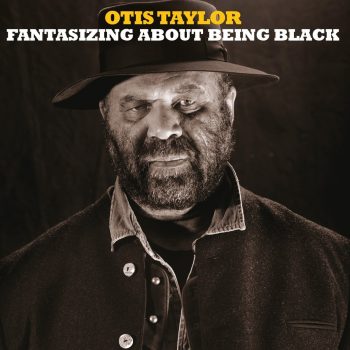 (5 / 5)
(5 / 5)
I am a great admirer of Otis Taylor. A true “one off” as an artist. For some he is an acquired taste and sometimes a little too “off the wall.” I must admit, when I have heard and reviewed some of his previous releases, I can say that not every track has floated my boat so to speak. Some of it has been a tad too “out there” perhaps, if that is the correct phrase.
His latest album, the 11 track offering he produced and arranged, is written entirely by him. The material is hard-hitting stuff lyrically. As usual with Otis. But his commentary on racism through the ages could not be more pertinent than today. This is as much about slaves and the persecution of the Negro in times gone by, as horrific cases like Trayvon Martin and Stephen Lawrence from far more recent days.
Is it any good? Do I need to skip tracks with this one. The answers are “hell yeah” and “hell no.” Quite simply his best album yet, and a stunning job. It nails that authentic roots blues mood to the frigging wall. And some. You may need a minute for a sit down in a quiet corner after hearing this for the first time.
“Fantasizing About Being Black”, is a raw and haunting multi-instrumental blend that reveals the connection of history to modern day events; and features the legendary Jerry Douglas, young guitar prodigy Brandon Niederauer and Ron Miles.
Following his 2015 psychedelic trance-blues release “Hey Joe Opus/Red Meat”, the new record is a stark and poetic lesson on the historical trauma of the African American experience, from the voyages of slave ships to the Mississippi Delta.
Blending his unique songwriting and the compelling musical approach that he calls “trance-blues,” the recording inspires with stories of the enduring human spirit, letting its hypnotic sound as well as Taylor’s lyrics, tell a story of continuing struggle. He is a born story teller and an expert at setting the right tone, an emotional ambience that is quite mesmerising at times. The topic may be heavy, but this does not detract from the musicality. Not at all.
His 15th album is about “the different levels of racism in the African American experience that are unfortunately still with us today. The history of African Americans is the history of America,” Taylor says. “After 15 albums, I’ve taken all of my thoughts about the history of racial injustice and created a musical interpretation for modern times. When I started recording in 2015, I had no idea the topics would become even more relevant,” Taylor says.
He experimented with banjo and fiddle because, as he says, slaves on the southern plantations played those instruments and he aimed to include the richness of the early African slave instrument sounds throughout the record. It works. The stripped down nature of his work, adds huge value to the intensity of the material, and the messages. He never clutters a track with unnecessary instrumentation, and the vocal is passionate and as natural as can be.
The album introduces seven new songs. “Banjo Bam Bam,” the story of a slave in shackles, feels like West African trance rhythms with a dose of Chicago; “Tripping on This,” an ode to an unlikely father-son reunion, evokes John Lee Hooker; “D to E Blues” recalls the constant yearning for freedom in an acoustic blues style.
“Jump Out of Line” pays homage to the ever-present fear in Civil Rights marches in a style that touches on Mississippi Hill Country blues; “Just Want to Live With You” cites the hypocrisy of a public official keeping a black mistress and features melodic lead guitar accents from teenager Brandon Niederauer.
“Roll Down the Hill” is a rally call to get up when you’ve been pushed down; and “Jump to Mexico” reflects the perils of interracial relationships in the recent past and highlights slide guitar master Jerry Douglas in a soft and heartbreaking Americana ballad.
Taylor also reinterprets some of his most compelling material. “Twelve String Mile,” “Walk on Water,” is an acoustic power-driven whaler’s sleigh ride, with seamless interplay of guitar and cornet. “Hands on Your Stomach,” combines Taylor’s signature trance music with textured psychedelic leads from Brandon Niederauer.
“Jump Jelly Belly,” is a story told to him by a retired General about African American troops in WW2, who had the dangerous job of transferring cargo between ship on the open seas, and they had to jump across from ship to ship, with waves up to six feet high. Falling would mean they were crushed between the two ships. A soldier nicknamed “Jelly Belly” who was scared to jump, inspired shouts from the other soldiers of, “Jump Jelly Belly.”
Band members include violinist Anne Harris, who often plays melodic and textural foil to Taylor’s idiosyncratic, mesmerizing guitar, drummer Larry Thompson, and bassist Todd Edmunds. Their expertise is complemented by special musical guests Jerry Douglas on koa wood lap guitar, cornetist Ron Miles, and young lead guitar virtuoso Brandon Niederauer.
Taylor has been pursuing his own singular musical vision — a fusion of the primal hum of raw, primitive blues and contemporary, free-ranging expressionism — since the 1960s, when the banjoist, guitarist, bassist and harmonica player first toured the U.S. and Europe with a variety of blues-based bands including Zephyr, for whom Taylor played bass, and T&O Short Line, which included the late legendary guitarist Tommy Bolin.
Taylor left the music business in 1977 to pursue dealing in art and antiques, and to raise a family. He also pursued his passion for bicycle racing, as a coach. During the ’90s, Taylor was drawn back into music making by a friend. By 1996 and the arrival of his debut album “Blue-Eyed Monster”, he was performing once again. Taylor began to emerge as a singular voice in the American roots scene, acclaimed for his unflinching honesty in writing about racism, struggle, freedom, heritage and the complications of human life.
He has won many awards and been nominated for many more. His most recent album, “Hey Joe Opus Red Meat”, is on display in the new Smithsonian Museum of African American History and Culture. Otis toured Europe six times opening for the late guitar legend Gary Moore.
By Simon Redley
 (1 / 5) ‘Dull Zone’
(1 / 5) ‘Dull Zone’ (2 / 5) ‘OK Zone’
(2 / 5) ‘OK Zone’ (3 / 5) ‘Decent Zone’
(3 / 5) ‘Decent Zone’ (4 / 5) ‘Super Zone’
(4 / 5) ‘Super Zone’ (5 / 5) ‘Awesome Zone’
(5 / 5) ‘Awesome Zone’





